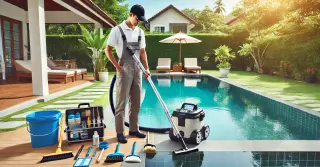Residential Pool Maintenance Brunswick GA

Effective residential pool upkeep begins with consistent cleaning and debris management. Ensuring your pool is free from dirt, leaves, and other debris is important for both looks and sanitation.
- Surface Skimming and Pool Vacuuming: Routine skimming and vacuuming are essential tasks for maintaining a clean pool. Use a pool skimmer to remove floating debris such as leaves and bugs, and vacuum the pool bottom to remove dirt and sediment. This ensures clear water and prevents the growth of algae and bacteria.
- Brushing Pool Walls and Cleaning Tiles: Don't forget to clean the pool walls and tiles frequently. Brushing the walls and scrubbing tiles helps prevent the buildup of algae, calcium, and other residues. Use a brush suitable for your pool’s surface, whether it's plaster, fiberglass, or vinyl, to prevent damage. Routine cleaning keeps your pool pristine and extends its lifespan.
Ensuring Proper Water ChemistryEnsuring correct water chemistry is vital for swimmer safety and comfort. Proper chemical levels prevent algae growth, bacteria, and other contaminants, while also safeguarding your pool's structure and equipment.
- Consistent Chemical Testing and Balancing: Frequently test your pool water to monitor chemical levels, including pH, chlorine, alkalinity, and calcium hardness. Use a high-quality pool test kit to ensure precise readings. Adjust the chemical levels as needed to keep the water balanced. Well-balanced water prevents corrosion, scale buildup, and cloudiness, ensuring a safe and pleasant swimming environment.
- Using Pool Chemicals Safely: When handling pool chemicals, always follow the manufacturer's instructions and wear appropriate safety gear, such as gloves and safety glasses. Add chemicals in the right order, and do not mix them directly, as this can cause harmful reactions. Store chemicals in a cool, dry location, out of children’s and pets' reach. Safe chemical use protects everyone and keeps your pool water pristine.
Regular Equipment Inspections and MaintenanceConsistent inspection and maintenance of pool equipment are vital for smooth pool operation. This includes pumps, filters, heaters, and chlorinators, which are all key components in keeping your pool clean and functional.
- Checking and Cleaning the Pool Pump and Filter: Consistently monitor your pool pump and filter to ensure they are working properly. Clean or replace filter cartridges as required to keep filtration effective. A well-functioning pump and filter maintain clear and clean water, lessening the need for chemical treatments.
- Inspecting Heaters and Chlorinators: Make sure your pool heater and chlorinator are functioning correctly. Inspect for any wear and tear, such as leaks, rust, or faulty parts. Consistent maintenance and timely fixes can avoid costly repairs and increase the lifespan of your equipment. A well-maintained heater ensures comfortable water temperatures, while an effective chlorinator keeps the water sanitized.
Residential pool maintenance involves regular cleaning, balanced water chemistry, and equipment maintenance. By following these guidelines, you can ensure a safe, clean, and inviting pool all season long.




